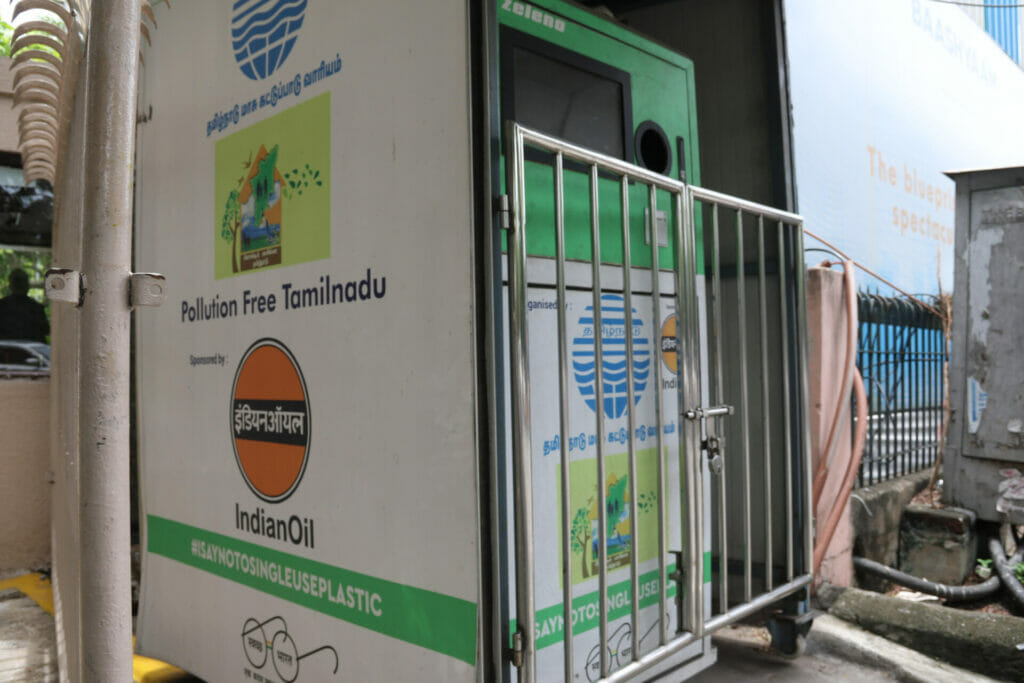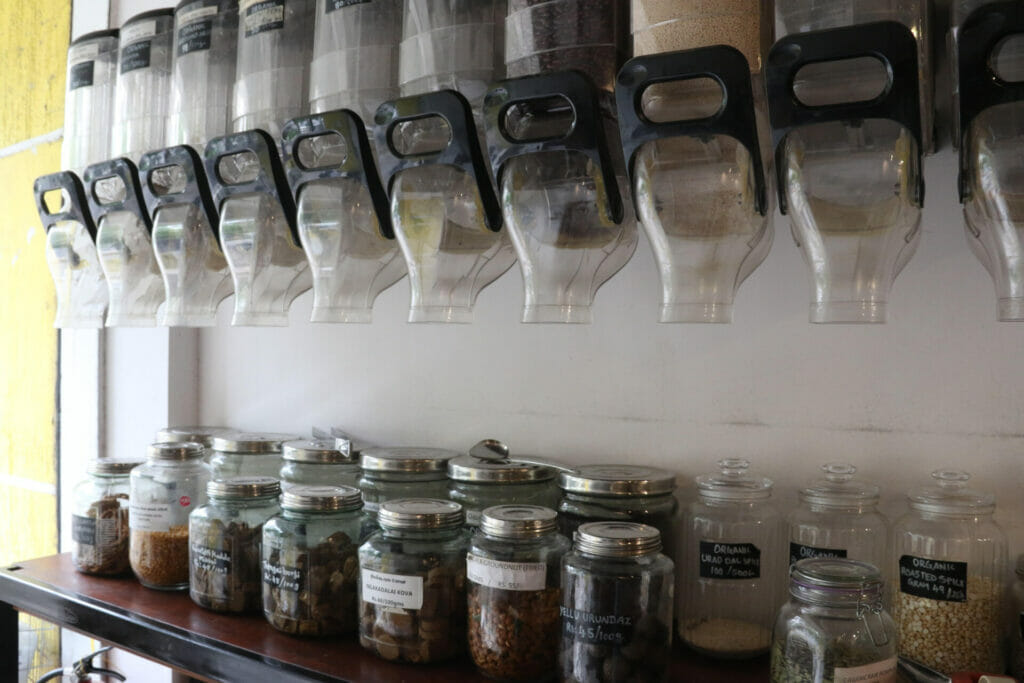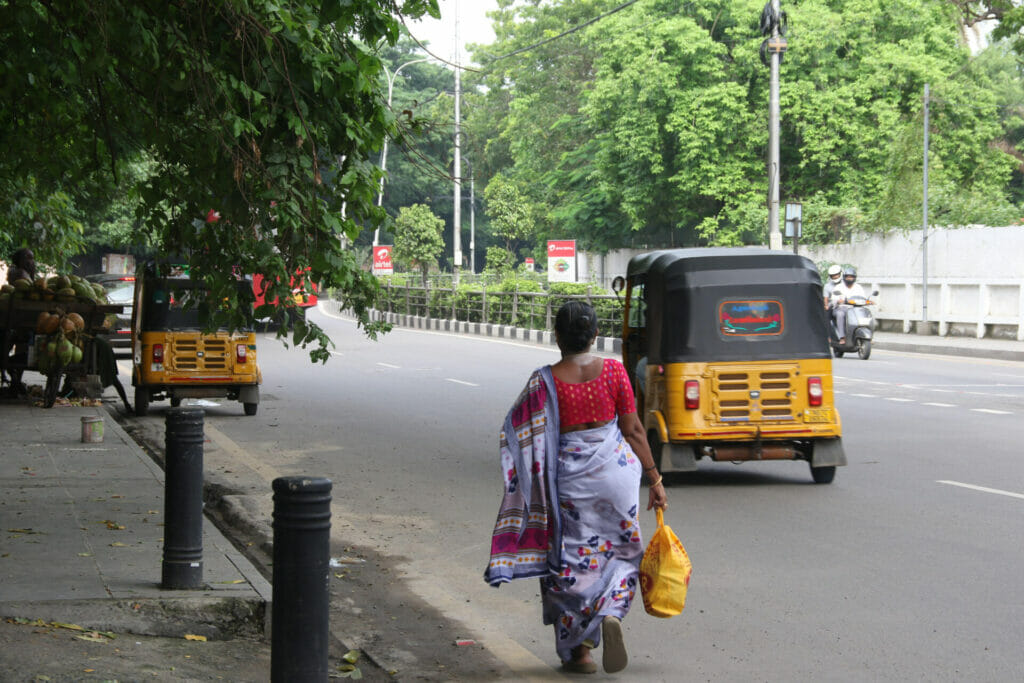Mayilsamy, a street vendor in Purasaiwalkam who sells toys and trinkets, remembers when the news of the single-use plastic ban broke.
“I tried to tell my customers to bring their own bags,” says Mayilsamy. “But very few people brought them.”
In January of 2019, the Tamil Nadu Pollution Control Board (TNPCB) imposed a ban against the use of almost all single-use plastic (SUP) products in the state. The ban is one of many measures brought about to reduce the presence of harmful plastic products.
Since the ban, the Pollution Control Board, along with other agencies such as the Greater Chennai Corporation (GCC) have been working to curb the use of single-use plastic.
From imposing fines and conducting raids to the much-publicised Meendum Manjappai campaign urging consumers to switch to yellow cloth bags, many attempts have been made to curb the use of single-use plastic with varying degrees of success.

Read more: Two years since the ban, plastic is back in a big way. Is COVID the real reason?
Reasons the single-use plastic ban has been ineffective
The single-use plastic ban contains many intricacies and is one of the key steps taken by the state in recent times to curb plastic use. The ban made it illegal to use 14 categories of food-related plastics, such as straws, takeaway bags, plastic containers, and plastic cups.
While this campaign was initially regarded as very successful off the bat, when COVID-19 hit, many people reverted to the use of single-use plastic.
“Before COVID-19 there was momentum, but once the pandemic hit everyone switched to disposables and the single-use plastic ban was completely ineffective. After COVID-19, everything went for a toss,” says P Natarajan, the Founder of Namma Ooru, a sustainability-centered non-profit.
Natarajan’s organization approaches various businesses and schools to elaborate on the benefits of making the switch away from single-use plastic.
Natarajan says that even after explaining the reasons for making the switch, some people are still not open to the alternatives.
Many activists around Chennai, including Jayanthi Premchandar, a solid waste management enthusiast, note that the majority of consumers opt for plastics because they are cheaper.
“Everything the government is doing is putting the onus on the consumer’s side. The majority of the population in India is economically weak. Why would they buy a cloth bag for 10 rupees if they are going to get plastic for free?” asks Jayanthi.
From the point of view of vendors, the prohibitive cost of cloth bags and other sustainable alternatives has prevented them from making the switch away from single-use plastic bags.
“We sell items that are not priced too high, if we switch to cloth bags we have to charge the customers and they may not be willing to buy from us,” says Mayilsamy. “Many small vendors still use plastic bags due to this issue. We can’t bear the cost of the bags and make a profit.”
The people who purchase from Mayilsamy are people usually passing through the area. Mayilsamy explains that they don’t usually plan their purchases or have a bag on hand all the time.
Somasundaram, a vegetable vendor in Pudupet, has similar grievances regarding the single-use plastic ban.
“I sell very small quantities so it is not possible for me to give customers cloth bags. While some of them bring their own bags, many ask for plastic covers,” says Somasundaram. “I cannot refuse them. I have been told that there will be fines for giving items in plastic covers, but what choice do I have?”
Somasundaram feels that small vendors may be able to move to better alternatives only if there is support from the government.
“They can help us buy cloth bags for a cheaper rate. At present it is not possible for me to incur that expense. Because of the circumstances, I continue to use plastic covers,” he says.
Cracking down on single-use plastic at source
Since the single-use plastic ban was imposed, the GCC has been conducting regular raids at various shops throughout the city.
Since the ban, the TNPCB estimates that the GCC has seized around 448 tons of single-use plastic throughout Chennai.
Some hold reservations about conducting these raids, especially as it has to do with small businesses.
“Look at the number of raids the Chennai Corporation has conducted. It is not practically viable,” says Natarajan. “In order to solve the problem it is important to have a discussion with shopkeepers and showcase a viable alternative. Without any alternatives, raids are not going to help.”
As Natarajan explains, to “catch” every business using single-use plastic seems out of the scope of agencies, given Chennai’s population. Moreover, many of these small businesses can’t afford the alternative or don’t understand the benefits of switching to alternatives.
“Implementation is very difficult. The only way one is going to get rid of single-use plastic is to cut off the source. You can’t lose sight of the fact that production of these products is problematic, so until that is done, one cannot seriously make a dent,” says Sumana Narayanan, Senior Researcher with Citizen consumer and civic Action Group (CAG).
The TNPCB is aware of these barriers in properly implementing the ban and is working to limit them.
“We have been trying to find the manufacturers of these bags from the information provided by retail vendors but the chain is huge and it is not easy to trace the bags to the source,” says officials of the TNPCB. “We have managed to crack down on some illegal manufacturing units based on complaints and tip-offs that we receive.”
TNPCB officials add that when they find manufacturers, they order the shutdown of these shops and cut off electricity. But even then the challenge is that they move to different locations and continue their operations.
Read more: Must return to our past and ‘Manjapai’ for a better, plastic-free future: Supriya Sahu, IAS
Meendum Manjappai campaign and other efforts against single-use plastic
In the past few years following the ban, many initiatives have been started to help Chennaiites make the switch away from single-use plastic. Notable among them is the Meendum Manjappai initiative.
This initiative calls on the nostalgia and familiarity of the Manjappai – a yellow cloth bag – to reduce plastic bag use. Various vending machines throughout the city can be found selling these bags for just 10 rupees.
In the coming month, the TNPCB plans to install more of these vending machines across Chennai, making them more readily accessible.
“It’s a nice idea and resonates with people. It has brought a lot of conversation on the issue, but with any attempts at awareness like this it’s hard to estimate what the impacts of it are, and the problem is that it’s on the consumer to act,” says Sumana.
The TNPCB has been augmenting this with other moves such as the launch of the “Meendum Manjappai” app that allows consumers and businesses to access a list of manufacturers who produce sustainable alternatives to single-use plastic.
TNPCB officials say that the cost and convenience issues are understandable reasons for people to continue using single-use plastic and that they are working to create more understanding around the alternatives.
There are other small promising signs with the rise of stores promoting sustainable packaging alternatives. Some neighbourhood stores in more affluent areas have been able to move away from single-use plastic. EcoIndian, for example, requires its customers to bring all of their own containers and has gone completely zero-waste. Stores like these can be a model for future changes.

On top of this, and the addition of more Manjappai vending machines, many community-based organisations such as Namma Ooru, and CAG, and activists like Jayanthi are always looking for people to join their efforts to help Chennaiites rid the city of the menace of single-use plastic.
Resources by the TNPCB
List of manufacturers of eco-friendly alternatives to single-use plastic can be found here.
Manjappai vending machine locations can be found here.
Residents can also lodge complaints about the use of single-use plastic on the Meendum Manjappai app.
